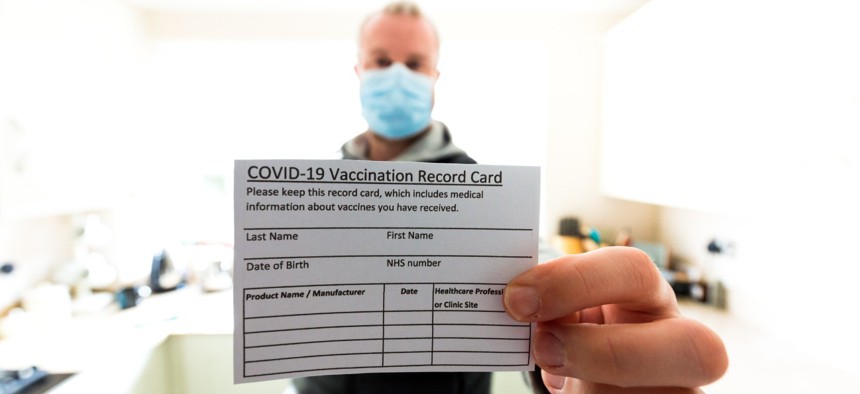
coldsnowstorm / istock
Feds Could Be Fired, Imprisoned for Lying About Vaccination Status
Unions may have to bargain over vaccination policy implementation after the fact.
Federal employees who misrepresent their COVID-19 vaccination status to their agencies face firings and potential criminal prosecution, the Biden administration warned on Friday.
The Safer Federal Workforce Task Force—a group President Biden created by executive order that is led by the White House, General Services Administration and Office of Management and Budget—confirmed in new guidance agencies would not initially ask for proof of vaccination, but they could follow up for documentation if they receive “a good faith allegation that strongly suggests” an employee lied on their attestation form. Those “certification of vaccination” forms will soon go out via email to all federal employees, with an Office of Management and Budget official saying that process will begin next week.
While agencies will initially rely on the honor system as it begins asking employees for their vaccination status, the administration made clear there could be consequences for lying.
“Federal employees who make a false statement on the Certification of Vaccination form could be subject to an adverse personnel action, up to and including removal from their position,” the task force said.
It added it “is also a federal crime” to provide false information on the form, pointing to federal statute that prohibits lying to the federal government. Employees who misrepresent their vaccination status could also lose their access to classified information, the administration said. On their certification forms, employees will be further met with the message, “I understand that a knowing and willful false statement on this form can be punished by fine or imprisonment or both.”
Most federal employees are not yet facing a requirement to be vaccinated. Those who do not attest they are vaccinated, or who decline to answer, will be subject to weekly tests, mask requirements, physical distancing policies and restrictions on travel. In areas with high transmission of COVID-19, which currently includes Washington, D.C., even vaccinated employees must wear masks.
A template email for agencies to use when sending the certification form to employees lays out those policies.
“These requirements take steps to prevent the spread of COVID-19 to protect the health and safety of our workforce,” the email reads.
The task force stated that the new vaccination requirements constitute a governmentwide policy, meaning unions cannot negotiate over the policy itself, although they may bargain over how it is implemented by each agency. But how that happens in practice is complicated by the fact that some federal workers continue to report to work sites, while others work remotely.
“There may be collective bargaining obligations over the impact and implementation of the agency model safety principles and CDC guidelines (including with respect to the Certification of Vaccination form),” the task force wrote. “Implementation of the principles and guidelines is essential to protect the health and safety of all federal employees, onsite contractors and individuals interacting with the federal workforce in federal buildings, in federally controlled worksites and on federal lands.”
For workforces that have been working from a maximum telework stance since the beginning of the pandemic, the task force urged agencies to bargain over “impact and implementation” before they move forward with reopening federal offices. But feds who report to the office before those negotiations are complete despite working remotely will have to comply with the new rules and attest their vaccination status or submit to masking and regular testing for COVID-19.
At workplaces where federal employees have been unable to telework, the task force anticipated that implementing the new policies constitute an emergency, meaning that in many cases, unions likely will only be able to bargain on a post-implementation basis.
“Since agencies need to act quickly due to the COVID-19 emergency and to protect the health and safety of onsite employees, contractors and visitors, agencies are strongly encouraged to begin communicating with the appropriate union representatives as soon as possible and otherwise satisfy any applicable collective bargaining obligations under the law at the earliest opportunity, including on a post-implementation basis where appropriate.”
National Treasury Employees Union National President Tony Reardon noted that the penalties for lying on the vaccine certification form "closely track" with other disclosure forms required to work in government. "The release of this form and the related guidance will aid our discussions with agencies about exactly how the new vaccine and testing protocols will be implemented on the federal workforce, and when," he said in a statement. "[It] is clear the administration is moving quickly to implement this new vaccination and testing protocol on the federal workforce, and NTEU is in the process of bargaining the implementation to protect federal employee rights and make sure they are fully informed about their decisions."
Agencies should protect employees’ responses to vaccination forms in accordance with the Privacy Act, the task force said, but in many cases that will include sharing it with employees’ supervisors as they will have to enforce mask and other requirements. The task force has still not spelled out details on how the testing program will be operationalized, including where tests will be available, who will conduct them and how they will be processed. An OMB official said employees who refuse testing will face "progressive discipline," as they would for refusing to comply with any agency policy.
Employees who are not initially vaccinated will have the opportunity to submit a new form if they later receive the vaccine. Employees can check one of four boxes on the form: that they are fully vaccinated, partially vaccinated, have not been vaccinated or that they decline to respond. Even employees who are teleworking full time must complete the form. Visitors to federal buildings will also have to complete a form, unless they are there to “obtain a public service or benefit.”
This story has been updated with additional information from OMB.






